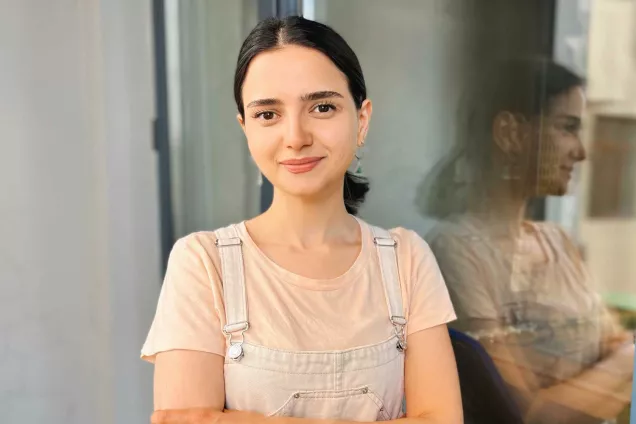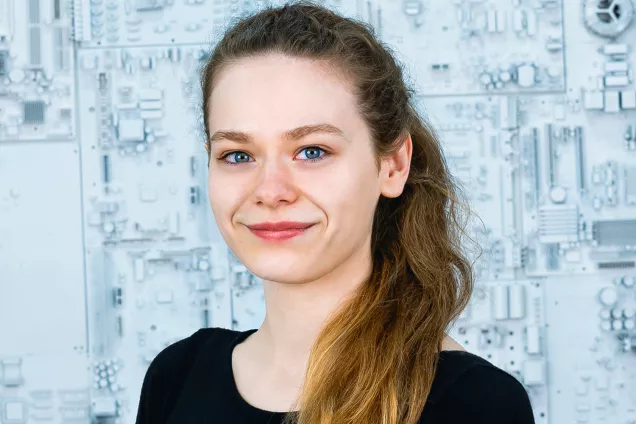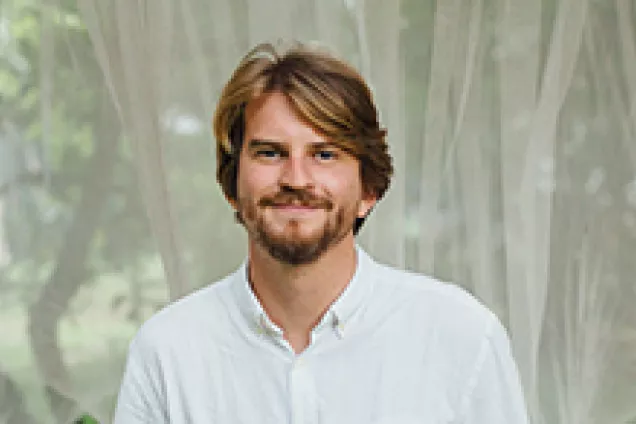What Agne says about the Master's in Media and Communication
Agnė Raščiūtė from Lithuania
What were you looking forward to the most before you came to Sweden?
"I was waiting to get my views broadened, to get to know more, not only about media and communication, which I chose to study, but also about myself – living abroad, creating new contacts, adjusting to a different culture, the language, and more. I was also looking forward to finding my place within academia. I wanted to understand whether I should pursue doctoral studies or whether my Master’s degree would be the final step for me."
Why did you choose Lund University? Did you consider other universities?
"I didn’t consider any other universities, because I clearly knew what I wanted from my Masters’ degree: high-quality sociological focus on various dimensions and structures of the media. Not that I know exactly what all other universities have to offer, but my professors at Vilnius University and researchers that worked in the media and communication field suggested to look into Lund University. According to them, and alumni of Lund University, this is one of the best universities in Europe to study media and communications, since it offers a different and very broad take on media. Also, Lund University is a university that provides you with a lot of opportunities to do research in different countries and to connect with many international students and researchers. I think it is an especially amazing environment to study communication."
What are the highlights of your time here?
"People! It is difficult to imagine being a part of another environment as diverse as the one Lund University offers. During a single lunch break, you can have a discussion about the US election, the government regime in Turkey or try to find words similar to your own language with, for example, someone who speaks Persian. I know that the internet and increased abilities to travel have made us all citizens of a global village, but seeing that village actualise in reality, in front of your eyes, is a very special moment.
Studying at Lund University has also broadened my knowledge about gender politics, and, in some way, the people and the variety of activities the university offers encouraged me to be more active and reflect on my own agency (activity/role) in society. That is what I wanted from university – to be challenged, but at the same time supported in my development."
What do you think about the programme and the course content?
"I think it is already clear that I am satisfied with the programme. The course content provides us with critical tools to look at the social, political and cultural contexts of the media. There is also a great emphasis on the importance of methodology and choosing the right methods, which is a crucial thing to me. My favourite class is ‘Media Audiences’. At first I was very sceptical/ignorant about audience research, but the content, assignments and readings for this class not only opened my eyes, but especially my ears to hear what the audience is saying, what people really think about things we theorise and study. The most important thing I took away from that class is the mantra: “assume less, investigate more”. It is really applicable in everyday life situations!"
How did you find the academic environment?
"I really like the flat hierarchy between lecturers and students. Previously, I have been treated a bit like I am “just an empty student that needs to be filled with knowledge”, but here I feel like I am respected and encouraged to contribute. Lecturers are very helpful, responsive and, most importantly, some of them really show you that you matter. They show you that you are an academic now and that you should think not only about writing a good essay, but also about what your voice is as a researcher, why you are looking into one topic or another, what your impact is and what you could change with your work.
So, as you can understand, classes are very interesting to me. Sometimes the classes may be very challenging, especially at the beginning when you are not as accustomed to studying in a foreign language (English), but it gets easier later on. Most importantly, you should not forget to ask questions. You have to let go of the ‘my question is very stupid’ fear. It doesn’t work here."
Is the way of studying different or similar to your home country?
"At Lund University we have a lot more group work than in Lithuania. At first I had difficulties working in a group, because I just wasn’t used to that. But little by little I learnt to appreciate hearing others' opinions and I also got to ‘train’ myself in listening, expressing my opinion or opposing other people's views in a calm manner, supported by arguments.
What shocked me the most was the pace of some of the courses. Some of them are just one month long, thus it was difficult to keep up with the readings and assignments. But you just learn; you find your pace, adapt to it and voila! I have noticed that I am more relaxed now during my second year, because I now know the technique, how to juggle readings, writing an essay and still maintain a social life. However, sometimes it would be nice just to be able to go deeper into a specific subject, because for now everything is so interesting and valuable!"
Will the things you’ve learned be useful for you when you go back?
"Of course! All the things I have learnt have also shaped me as a person and the individual I am now. So, whatever I choose to do – continue studying, working or travelling – will be affected by the books I read, by the lecturers I met here in Lund and by the Media and Communication programme."
Did you feel welcome in Sweden?
"You feel welcomed at Lund University. People in the streets will not say: “Oh hello, welcome!”, but you know that if you smile, they will smile back at you, and if you ask for help, everyone will help. Swedes speak English fluently, so there was no language barrier. There is also the possibility to learn the Swedish language for free and take part in workshops and lectures about Swedish culture and traditions. So, if you engage with them, soon you will feel like ‘one of them’."
Were you involved in any extracurricular activities?
"Yes, I was actively involved with ‘Projekt Sex’ (P6), an independent student organisation working with promoting sexual health on emotional, physical and social levels. I was the Education Evenings Officer, which meant I invited various speakers to talk about topics that were interesting to students. Later, I became a board member of the organisation.
Being involved in an organisation helps you to socialise outside your classmate circle, and you get to learn and improve your organisational skills. Here at Lund University everyone takes the student organisations very seriously. Usually, you have a board and auditors, so it is not only ‘fika’ (Swedish word for coffee break), but also strategising, listening to peers and of course having an awesome time too!"
How did you find the accommodation and the housing process?
"I did not get LU Accommodation housing, but I quickly found a place to rent. There are a lot of people renting out rooms in their houses. I had already lived in student housing for four years when I did my Bachelor’s degree, so this was a very good and interesting change."
What do you think about the city of Lund and Sweden
"I love Lund, because it reminds me of my favourite part of my hometown – old, in some ways nostalgic and calm. You feel safe here, because you will meet some students even late at night. It is a student city and you clearly feel it. If you want to have more ‘real life' experience, it is waiting for you in Malmö, just 15 minutes away by train. Sweden has very beautiful nature and there are a lot of hiking trails and bike roads you can explore."
Did you have any worries before coming here? How did things turn out?
"I didn’t have any worries. I guess maybe the only one was that I would feel that everyone was building on their lives back home while I would be here. But that turned out to be just a stupid anxiety, because I got so involved with the University and student organisation work that I didn’t even have time to sit and lurk on Facebook to see how other people were living and building their lives – because I am building my own life right now."

Meet our student ambassador Diana
Read her testimonial and chat with her via Unibuddy.

"It can really make you think in ways you never expected"
Barbora from Slovakia

"Providing me with necessary knowledge and skills"
Xuan from Vietnam

"Excellent context from which to build your future network"
Tim from New Zealand

"I wouldn’t have changed a thing if I could"
Kevin from Germany
